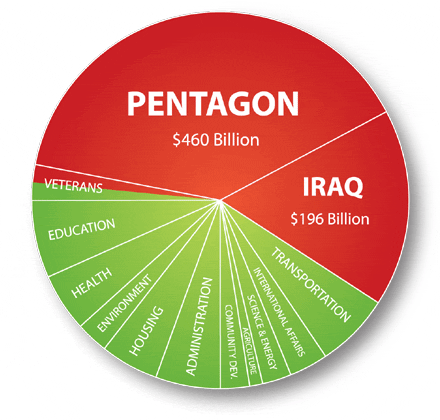Ellen Augustine and Barry Hermanson on reducing U.S. military spending and reclaiming tax dollars for human needs
Listen Now Download the show by right-clicking the link.

U.S. Budget Priorities chart (from NotMyPriorities.org)
Ellen Augustine and Barry Hermanson are California residents who have started a campaign to alert fellow citizens to the gross overspending of the US military budget. Their campaign, called Not My Priorities, centers on educating people through a simple pie chart about the discrepancy in spending on the Pentagon versus all other areas in the national budget.
Hermanson, who founded the campaign, was a Green Party candidate for Congress in California’s 12th Congressional District. Augustine also ran for the US Congress, and founded four non-profit organizations. This is an inspiring interview with two people who believe Americans can harness their democratic process, and really make a difference.
In Part 1 of this episode, Dr. Caldicott starts the interview with Augustine by remarking how the U.S. military consistently argues that huge defense budgets are necessary and justifiable because they create jobs. She asks Augustine how many jobs are really created in the military, versus how many jobs could be created in health care, education, renewable and alternative energy and other environmental sectors if spending priorities were allowed to change. Augustine presents striking figures that spending on these other sectors would created twice as many jobs.
Next, they look at the current U.S. defense budget, and those large “black areas” where more money is spent but not accounted for, and might be used for nuclear weapons research, “homeland security,” veterans affairs, and paying down national debt because of present or past wars. Augustine says that the U.S. public is brainwashed that security is only achieved by military spending. She points out how America spends more than all countries combined on weapons and the military. Read the June 9 article Worldwide military spending on weapons hits
record high.
Augustine says the Not My Priorities campaign encourages citizens to distribute thousands of postcards showing the pie chart above to all members of Congress and the Senate. She describes the huge battles in Washington to allocate the one-third of tax dollars that are left over for social programs like education, housing, transit and health care, after two-thirds of tax revenues are handed over (usually with little debate) to the insatiable military.
Dr. Caldicott and Augustine converse about the hair-trigger alert launch status that U.S. and Russian nuclear weapons are still on, and the arms reductions promised by Presidents Obama and Medvedev. They also explore what percentage of the U.S. military budget is spent on nuclear weapons. Augustine refers to UN Development Program reports that stress the importance of universal access to education, basic health care, food and water. She says the money the U.S. spends annually on nuclear weapons - $40 billion - could more than cover such essential programs for everyone on Earth.
Augustine describes the 700 to 1,000 U.S. military bases around the world, the strong opposition to those bases in most countries, and how expensive they are to maintain. See Mother Jones magazine’s interactive 2008 map, Mission Creep: U.S. Military Presence Worldwide. Also see this map of U.S. domestic military bases and this map of U.S. overseas bases (click on the highlighted state or country to see which bases are there).
Augustine mentions a report released in April this year, Transforming the U.S. Strategic Posture and Weapons Complex For Transition to a Nuclear Weapons-Free World, which recommends the U.S. and Russia first reduce their nuclear arsenals to 500 weapons each, what Augustine calls a “moral declaration” to lead by example on the road to global disarmament. Dr. Caldicott points out how fewer than 1,000 nuclear bombs exploding could bring about nuclear winter, making total and rapid disarmament between the nuclear superpowers extremely important. Listen to Dr. Caldicott’s interview with Professor Alan Robock one year ago for more information or nuclear winter and climate change.
Augustine sums up by saying that “when the public has focused on a new vision, the power of the people has prevailed.” She and Dr. Caldicott agree that now, with economics such a preoccupation, the U.S. public should want to support cutting the military budget when so many other problems need to be fixed, from poverty to the environment.
In Part 2, Dr. Caldicott begins her interview with Barry Hermanson by asking him to describe the pie chart in detail (see above – a more recent version of the pie chart with updated dollar figures is shown on the postcards Not My Priorities will mail anyone who is interested). Hermanson says the public can influence politicians to oppose war and weapons funding, and cites the evolution of Congresswoman Jackie Speier of California.
Dr. Caldicott ponders what would happen if most residents of California, a major weapons-production state, were educated about spending priorities and became firmly committed to reducing the military budget. Given the state’s dire financial situation at present, freeing up a large portion of federal tax dollars from the military budget would provide enormous benefit to California, not to mention the other 49 states.
Dr. Caldicott says that a national movement to drastically cut the military budget should start in California, and strongly recommends listeners contact the Not My Priorities campaign to get postcards to sign and distribute to legislators. She reminds listeners that Pres. Obama said in a speech that he can’t function as a bold, visionary leader unless he has the people behind him. Hermanson says that Congress, as well as Obama, must hear from more citizens about cutting the military budget. He notes that Congresswoman (and now Speaker of the House) Nancy Pelosi called for enlarging the Army and Navy at the end of 2007, and like many Democrats is often pro-war. Dr. Caldicott notes how Washington Democrats are frequently more hawkish and warmongering than Republicans so they can maneuver to raise money for social programs.
Six firms now produce most of the weapons in the U.S., Hermanson says. See the list, Top 25 Publicly Traded Companies Receiving Prime Contract Awards from the U.S. Department of Defense, Fiscal Year 2008. Weapons firms are focused on profit and expanding global arms sales. Read the June 13 article Weapons Makers Look Overseas as Pentagon Scales Back.
For more information, read Postcards from the Outraged: Ellen Augustine on reslicing the American pie and Green Party nominee [Hermanson] rallies to reduce military spending. Also read Jeremy Scahill’s April 9 article Billions More in War Spending: How Many Democrats Will Stand Up Against Obama’s Bloated Military Budget? and see the Global Issues web page about world military spending.

